CONAKRY, Guinea (AP) — The European Union (EU) has allocated hundreds of millions of dollars to the International Organization for Migration (IOM) to facilitate the return of tens of thousands of African migrants who attempted to reach Europe but failed. The funding aims to support these returnees as they reintegrate into their home countries.
However, interviews conducted by The Associated Press (AP) with several returnees in Gambia and Guinea reveal a concerning trend. Many of these individuals, who are often left traumatized by their migration attempts, report that they have received little to no economic assistance or support promised by the IOM. This lack of aid has led to fears that their desperation may propel new attempts to migrate.
The IOM, a United Nations-affiliated organization, has acknowledged the complaints but indicated it cannot comment on specific cases. The EU has not provided specifics on how the funding is allocated and an audit from the European Court of Auditors indicated that the EU "could not prove value for money" in the initial phase of the program from 2016 to 2021.
The IOM program, initiated in 2016, is designed to deter irregular migration by providing return flights for African migrants along with follow-up assistance upon their return. Between 2022 and 2025, the program successfully repatriated over 100,000 sub-Saharan migrants primarily from North Africa and Niger. Out of a total budget of $380 million for this period, 58% is earmarked for post-return assistance, which can include services such as housing, healthcare, psychosocial support, business grants, vocational training, and job placement.
Despite these intentions, the IOM's commitments appear to be falling short. Returnees have expressed their dissatisfaction with the organization, stating that they struggle with the trauma of their experiences, find themselves in significant debt, and feel ashamed upon their return to their communities. One individual, Kabinet Kante, a 20-year-old from Guinea, recounted his harrowing journey of almost two years trying to reach Europe. After being intercepted at sea and abandoned in the desert, he returned to Guinea with IOM's supposed assistance but has received no follow-up to his requests for vocational training.
Francois Xavier Ada from the IOM's regional office mentioned that over 90,000 returnees have initiated the reintegration process tailored to individual needs, with 60,000 completing it. The IOM is reportedly "concerned" about those who are left waiting and is willing to investigate individual cases. However, local IOM offices maintain confidentiality and refrain from discussing specific instances.
Experts have voiced concerns regarding the lack of accountability and transparency in how EU funding is managed, especially in vulnerable contexts. Josephine Liebl from the European Council on Refugees and Exiles criticized the absence of public scrutiny on the impact of the support provided to returnees. They argue that while the IOM's return program prevents inhumane treatment of migrants, the follow-up support is significantly hindered due to inadequate state services in many home countries.
Camille Le Coz from the Migration Policy Institute emphasizes that the crucial aspect of integrating returnees into society and accessing labor markets remains absent. Elhadj Mohamed Diallo, the director of the Guinean Organization for the Fight Against Irregular Migration, pointed out that the shortcomings in support could lead individuals to attempt migration once more. He framed migration as a natural phenomenon, suggesting that restricting movement is akin to trying to block a tide.
The situation raises significant questions about the effectiveness of the IOM's interventions and the EU’s financial commitments in addressing the root causes of migration and providing meaningful support to those affected.











